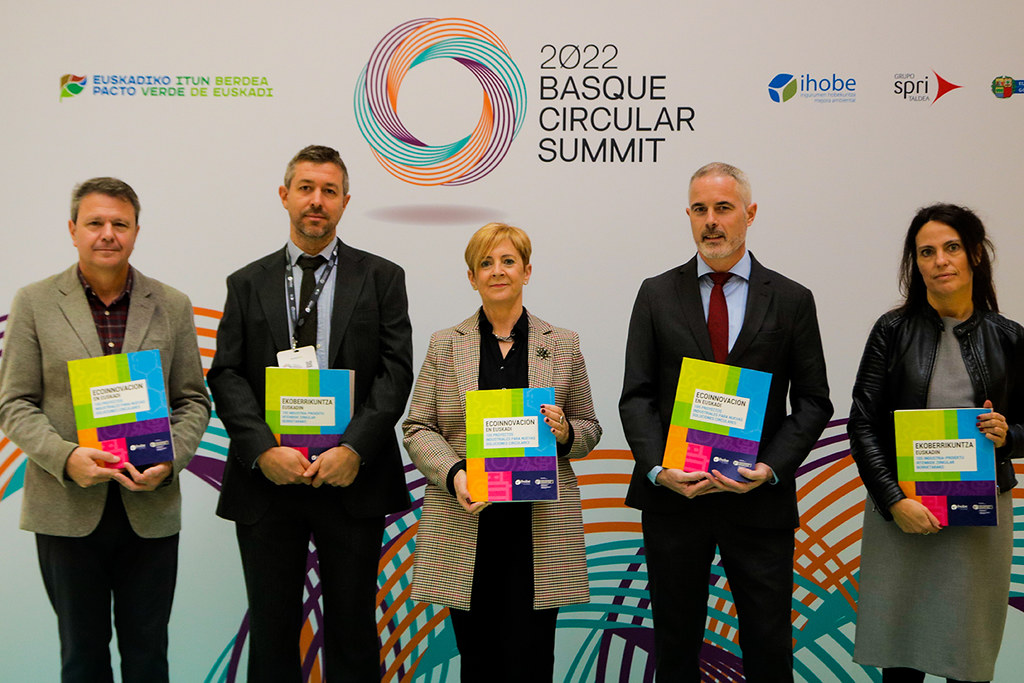- They are included in a guide presented today by the public company Ihobe at the Basque Circular Summit. Greenhouse gas emissions can be reduced by more than 40% through eco-design
- 24% of these circular solutions are operational or on the market and more than 50 projects are still in progress. Every public euro invested has generated an additional annual turnover of 21 euro in the private sector.
- The Basque Circular Summit comes to an end today after more than 800 people have taken part over 3 days, sharing results and successful developments related to the circular economy and eco-design in the Basque Country.
Ihobe, the Public Company for Environmental Management of the Basque Government, today presented a guide on eco-innovation in the Basque Country at the Basque Circular Summit, a topic that was the focus of the last day of the event. It contains 105 industrial projects promoted by fifty companies, a collection of successful examples of public-private collaboration in the region, which are expected to generate an additional annual turnover of 130 million euros in the coming years, 22 new business lines, almost 200 new jobs, savings of 228,000 tonnes of greenhouse gases per year and more than 300,000 tonnes of waste not disposed of in landfills per year. Every public euro invested has generated an additional annual turnover of 21 euros on the private market.
The circular economy and eco-innovation are necessary solutions in a European economic context that requires greater competitiveness and sustainability. There is a growing business need for innovative solutions aimed at reducing the consumption of raw materials and increasing the durability of products. The circular economy is one of the pillars for mitigating climate change, as greenhouse gas (GHG) emissions can be reduced by more than 40% through eco-design, reducing production waste and recycling materials such as steel, aluminium, plastic and cement.
As highlighted today at the Basque Circular Summit, the Basque Country has made a strong commitment to public-private collaboration to meet this challenge, with a number of practical examples. Among them, the Basque Science, Technology and Innovation Plan 2030 has been aligned with the Basque Circular Economy Strategy, setting eco-innovation and the circular economy as priority areas.
A hundred eco-innovation points of reference
The 105 projects included in the guide come from the following sectors: food, the automotive sector, consumer goods, construction and works, electrical and electronic equipment, machinery, metal, means of transport such as rail, marine and aeronautics, and the chemical sector. 24% of the new circular solutions included in this publication are already operational or on the market.
All of the projects have one or more motivating factors, including eco-design of equipment, reducing greenhouse gases, circular business models, environmental positioning and transparency, extended producer responsibility, green public procurement, plastics, best production techniques, reducing landfills, raw material costs and supplies, and minimising pollution.
The results help to create local eco-innovation reference points and pass on successful circular solutions to our SMEs As a result, examples such as the Baigorri winery (Álava), one of the main wine producers in the Rioja Alavesa, are shared. It is run by SOSTFEED, a project in which the Azti technology centre and the MIBA agricultural cooperative have both been involved. The project consists of reusing the only by-product from winemaking at the winery that is managed as waste, grape stalks. They are high in fibre and the project uses them as a functional ingredient for breeding rabbits.
Another project that has led to a solution that is now on the market is ECOBRIDGE, led by Bizkaian construction company Viuda de Sainz. This project is being used in the context of building Bilbao’s southern metropolitan bypass, and is a structural concept that is radically different from the usual approach to bridge design. It features a modular eco-bridge to improve the end of its life cycle, as opposed to the usual demolition work. Its modularisation allows the bridge to be cleanly dismantled and reused on another site, without generating waste.
Sariki, a Gipuzkoan company which provides metrological inspection solutions and measurement services, is the driving force behind RETROFIT. The project consists of remanufacturing coordinate measuring machines. The technological upgrading of industrial equipment, and in particular Coordinate Measuring Machines (CMM), is a necessity to embrace Industry 4.0 and improve companies’ competitiveness. Sariki has developed the ability to analyse the equipment of any manufacturer and adapt (retrofit) it to the latest inspection needs, at a fraction of the cost of purchasing new equipment.
At the time of going to press, more than 50 projects are still in progress and their results will gradually be incorporated over time, together with other projects from later calls, into the new regularly-updated versions of this document.
Closing ceremony of the Basque Circular Summit
The Basque Circular Summit 2022 comes to an end today. The congress brought together more than 800 attendees and around 350 companies over three days. The aim was to bring the latest in circular economy and eco-design to the Basque Country so that it can continue to be a European leader in this field and help Basque companies prepare for an imminent more circular landscape.
The Basque Circular Summit made it clear that the circular economy is a paradigm shift, and that there is no other option. To address this challenge in a more focused fashion, the congress featured parallel sessions for the different sectors, looking at the new regulatory and market guidelines (what customers are asking for) that are driving companies to work on improving their environmental performance. The 11 sectoral sessions demonstrated that there is a commitment to using recycled materials, increasing the useful life of products, greater efficiency in production processes and developing circular business models.
At the same time, one of the challenges identified focuses on consumers. The congress emphasised the fact that one of the keys to the process is to make them aware of the environmental improvements that are being incorporated into products and services and the need for clear and concise information to achieve this.
This year’s Basque Circular Summit also highlighted the importance of collaboration between companies when it comes to taking advantage of the opportunities for improvement offered by the circular economy, given that no organisation can drive the circular transition on its own. It also underlined the importance of measuring results for continuous improvement and the importance of digitisation as a crucial aspect in implementing circular economy principles throughout the value chain.
The circular economy promotes both business and territorial competitiveness. A holistic vision of where the economy and innovation are going in the region builds a specialist industrial fabric, enhances skills, creates demand for these new sustainable markets, delivers clear benefits in terms of sustainability and provides an important opportunity for progress in the field of collaborative governance.
The Basque Circular Summit showcased the positive results and advances that Basque companies have already achieved. Both the public and private sectors left the congress with medium and long-term challenges, including monitoring legislation, technological developments based on closer links between value chains, implementing green taxation instruments, developing green public procurement, the need to extend investment aid and deploying circular economy infrastructures in the region, particularly in relation to waste management.
![]() Further info: Eco-Innovation In the Basque country. 105 Industrial Projects for New Circular Solutions
Further info: Eco-Innovation In the Basque country. 105 Industrial Projects for New Circular Solutions




